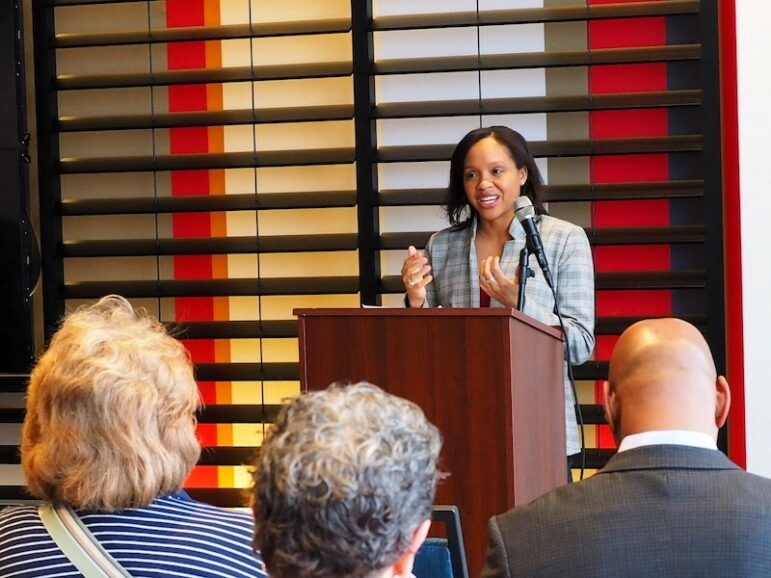
Massachusetts finds itself in an unusual job market in the post-Pandemic period. The state added more than 50,000 jobs from 2019 to 2023, but at during the same period the workforce declined by 113,000 people, creating a tight job market.
Last week, Secretary of Labor and Workforce Development Secretary Lauren Jones spoke at an event hosted by the Charles River Regional Chamber at Watertown’s Hampton Inn & Suites. She discussed ways that the Healey-Driscoll administration seeks to help businesses fill their openings, and train people for to meet the needs of the state’s labor market.
Workforce Snapshot and Plan
Massachusetts is in the middle of completing the Workforce Innovation and Opportunity Act report, which must be submitted every four years. A draft plan has been released, and the State seeks comment. Listening sessions have been held to get input from the business community and other employers, Jones said. See more information here.
The strongest sectors are biotech, AI innovation, and STEM, according to the plan, but those areas also have a significant number of openings.
“This points to potential skills gaps as labor force exits outpace new entrants,” the report reads.
During the Pandemic, “burnout” of workers increased, with some areas seeing a significant number of people leaving for new careers.
“There was a 51 percent increase in the rate of workers switching from jobs in healthcare and educational services to jobs in professional, scientific, and technical services,” the report reads.
Sectors that saw the most job losses include tourism, food service, and retail.
Education was also a significant factor. Employment of people with a bachelor’s degree increased by 5 percent, while the employment numbers dropped for those with less formal education. However, the demand may still be there, the report concluded.
“Notably, there is an observed wage growth for jobs requiring less formal education, suggesting a demand for these roles,” the report read.
In an effort to provide help beyond those seeking to go to college, the Charles River Regional Chamber’s scholarship is now available to those attending community college or other accredited post-secondary training programs, said Chamber President and CEO Greg Reibman.
“We’re expanding eligibility because we’ve come to recognize that there’s more than one path students can take to a fulfilling career, just as different jobs require different skills, knowledge, or credentials,” Reibman said in the announcement of the opening of this year’s scholarship applications.

The age groups most negatively impacted in the current labor market are 16-24 and 65+.
Immigrants also play an important role in the Massachusetts economy, according to the report.
“(F)oreign-born workers are playing an increasingly critical role in Massachusetts’ workforce, emphasizing the need to address barriers like English proficiency and legal work status,” the report reads.
State Initiatives
The administration has announced efforts such as free community college programs for those over 25 who do not have a college degree, but also to tap into new sources of workers, such as the recently arrived immigrants — including those in shelters.
The Job Skills Training Program was started by the Healey-Driscoll administration and the Commonwealth Corporation to link employers with immigrants who have skills that they are looking for. The program offers 12 and 24 week on-the-job training courses at participating employers, and participants will receive payments following the successful completion of the training course.
According to the JSTP information document released by the state, the immigrants are considered unpaid interns, not employees, so the companies would not be in violation of federal law for participating. Find out more about the program by clicking here.
The Governor also worked with the Biden administration to run two-week clinics to get work authorizations for 3,000 people in shelters in Massachusetts, Jones said.
Another effort is to retrain people looking to pivot in their career. One effort by the state is MassReconnect, which is available to people age 25 and over who have been a permanent legal Massachusetts resident for at least a year and do not have an associate or bachelor’s degree. The program covers tuition, fees, and provides an allowance for books and supplies.
MassBay Community College recently announced it is offering MassReconnect programs in Automotive Damage Appraisal, Behavioral Health Technician I, Behavioral Health Technician II, Certified Nursing Assistant (CNA), Emergency Medical Technician (EMT), English as a Second Language (ESL), and Phlebotomy.
Find out more about MassReconnect by clicking here.